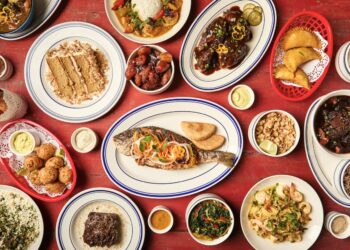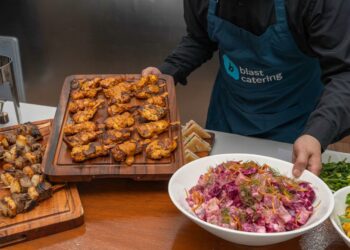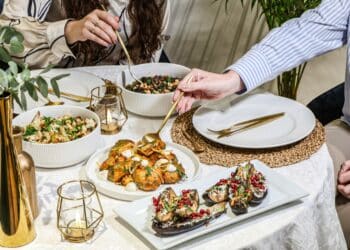Deep in the Dubai desert there is a herd of 12,500 Holstein Friesian cows, producing around 350,000 litres of milk every day for Al Rawabi Dairy. With over 200 trucks, each day they supply more than 400 tonnes of high quality fresh products through almost 10,000 stores in the UAE, Oman and Qatar.
Hidden amongst the myriad of camel farms in Al Khawaneej, you would be hard pushed to recognise the 300 acre Al Rawabi Dairy plant as a farm as there is not a cow insight… Instead they are all lounging in air conditioned boudoirs.

In order to sustain the welfare of these desert dairy queens in the soaring desert heat, they are cooled with a special “air conditioning” system, which is automatically turned on whenever the temperature goes above 21C. Furthermore, these pampered heffers are being showered daily
Five veterinary doctors and a team of 15 veterinary assistants – the so called “cow’s health team” are on-site to help the cows 24 hours a day. Besides that, Dubai Municipality also carries out daily checks on the raw milk, milk in the tanks, milk after the pasteurisation in the farm, and products in the store.
Abyson Jacob, Al Rawabi Dairy deputy sales and marketing manager, boasts that Al Rawabi is the only producer able to get its milk from the cow to the store in under 24 hours, which gives it a shelf life of four days, extending to six if it is refrigerated properly.
Every pregnant cow, which can weigh between 500-700kg, is milked every seven hours and produces 35 litres of milk per day, with the farm collecting milk around the clock.
A cow can become pregnant and begin producing milk from the age of 14 months. Providing she reaches the height of 132 cm and weighs about 350-400 kg she is checked to see if she is healthy to have a calf, and then she is sent to become pregnant by insemination.
Like humans, cows carry their babies for nine months, and while pregnant they continue to be milked for seven months. The farmer stops milking the cow two months prior to the birth, so she can devote all her energy to producing her new calf.
Each cow has a unique ear tag – her ID, which records her entire life history from the date of birth. She will remain an active milk producer until the average age of eight, when she is culled and sold for meat.
All new calves are fed with water and cow milk replacements at first, then as they grow a little (some 45 days), they are given cornflakes to teach them how to chew, before developing on to grass, corn, soya, and bran. These cows even get a dessert, in the form of molasses, which is a by-product of the refining of sugarcane or sugar beets into sugar.
Jacob says: “Only the high quality feed – tested and checked, both in the company, and by Dubai Municipality, can be served as food to cows. It comes from different places in the world – such as Sudan, Egypt, USA.
“The pregnant cows come from their air-conditioned tents and are washed every time before going for milking. They cows will wait at the gate that leads to the milking shed, so that they are the first in line to be milked. The milking machine collects the milk into the containers and sends the milk to the filter. After milking, the cows are washed again and dried off, and they can go back to rest.”
Each cow’s milk is tested for any possible infection, bacteria or any other health problems associated with cows. If the cow is healthy, her milk will be used for production, but if something with the milk is not 100% perfect, that milk is thrown away immediately.
When milk is taken from a cow, its temperature is 38C degrees, in order to kill any bacteria that may arise the milk is pumped into a cooler where, after 10 minutes, it is cooled below 5C degrees.
“Once the good milk is transported to the farm silos, additional lab tests in the farm are also made to ensure the pure quality of milk. Once approved, the milk is ready to be pumped into plant storage silos where it undergoes pasteurisation, homogenisation and standardisation to turn it into the products we find in stores throughout the region,” adds Jacob.
Pasteurisation is a process that heats every single part of the milk before cooling it again. It is done for two reasons: to remove all bad and unhealthy bacteria and to improve the taste of products, such as yoghurt and laban.
Homogenisation is a process to separate fat and water in milk to make fat globules smaller, so that they stay together in the milk rather than separating out and floating to the top of the jug.
Standardisation is a process that removes or adds cream from the milk. This is how they make the products with a different fat percentage. Natural milk contains 3.6-3.8% fat naturally, followed by full fat milk (3.2%), low fat milk (1.5%), skimmed milk (0.5%), and double cream (6%).
Jacob says: “Although there is double digit growth in skimmed milk sales in the Middle East, in line with rising health concerns, the split in sales between full fat and skimmed remains at 75/25.”
Al Rawabi then adds good and healthy bacteria to its fresh yoghurt, YO! fruit flavoured yogurt and laban.
It takes around five hours for the bacteria to create a yogurt, and after that it is cooled and is ready to eat. The dairy producer also adds vitamin D to all of its milk, in line with GCC regulations that all fresh milk should contain a certain dosage of vitamin D. The company also began producing a ‘Super’ milk in 2014, which has a much higher dosage of vitamin D than the government’s enforced minimum.
Today, 100 ml of Super Milk gives you 120% of your RDA of vitamin D, 50% of your RDA of calcium, 40% of your RDA of vitamin B12, 40% of your RDA of vitamin A, 40% of your RDA of vitamin E, and 40% of your RDA of folic acid.
According to Jacob, Al Rawabi will begin to produce functional products in 2016, in both dairy and cheese, designed to help tackle obesity, diabetes and cardiovascular disease.
The company also produces a large range of fresh from concentrate juices, and plans to launch an iced coffee range, first in retail stores and later HORECA, including cappuccino and latte macchiato, on 20 October. Additionally, Al Rawabi will start producing long-life plain and flavoured milk in December, a breakfast cream will launch next year and labneh is in the loop. The company is also planning to launch a cobranded cheese in 2016, which will be produced in Saudi Arabia.
Jacob explains how the company has grown. “Al Rawabi was first established in 1989, with a herd of 500 cows imported from Germany and only 10 trucks for distributing. Today we have a herd of 12,500 home-grown cows, with 20 to 25 new baby cows born on the farm every day.
“Following an investment of AED 22 million in 2014 in a new third-generation automated filling line and pasteurisation line, we now run over 200 trucks, which each day supply more than 400 tonnes of fresh products to almost 10,000 stores in the UAE, Oman and Qatar.”
In 2010, Al Rawabi received the Best Environmental Practice Award from the UAE government, and again in 2013, and in 2012 it was awarded “Brand of the Year” by Superbrands UAE. Today it is certificated with world famous ISO standards ISO 9001 Quality Standard, ISO 14000 Environment impact standard and ISO 22 000 Food Safety standard.
“With 15% growth year-on-year we will soon expand the business geographically, starting in Kuwait and looking to cover the entire MENA region.”
However, Al Rawabi is not alone in facing continued pressure, particularly over pricing as the retail cost of its produce is regulated by the government and it has not risen for several years. Jacob elaborates: “The government controls the price of milk, juice and yoghurt and the last increase was in 2008.
“Our margins are shrinking annually and feed prices are rising constantly, and we face increasing competition from imports. As an industry we are lobbying the government for change.”
In the UAE it costs around AED2.5 per litre to produce milk, compared to AED1 in Saudi Arabia where the Kingdom grows its own hay and producers are given generous subsidies.
According to Jacob, the three largest retailers of dairy – Al Ain Dairy, Al Marai Dairy from Saudi Arabia, and Al Rawabi – supply 95% of the produce in the UAE, and Al Rawabi accounts for 30% of that supply.



































































